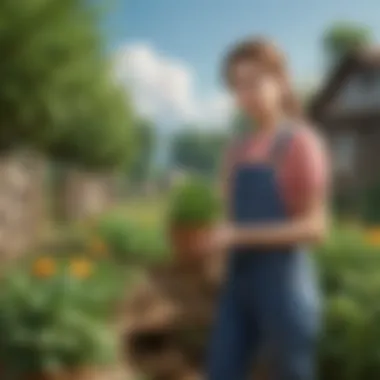Exploring Harvest Moon: Magical Melody's Legacy


Intro
In the vibrant world of video games, few franchises evoke as much nostalgia and passion as Harvest Moon. Among its numerous entries, Harvest Moon: Magical Melody stands out, embodying the core themes of agriculture, community, and personal growth. Much like a farmer toiling on the land, this game cultivates a unique atmosphere that draws players into its embrace, making them feel connected to their virtual farms and the characters that populate them.
Imagine stepping into the shoes of a charming protagonist who must revitalize a run-down farm, develop relationships with quirky neighbors, and embrace the cycles of nature. The game doesn’t just task players with growing crops; it encourages them to grow emotionally and socially. With its engaging mechanics and rich storytelling, Magical Melody remains a vital thread in the larger tapestry of Nintendo’s agricultural legacy.
In this exploration, we will dive deep into what makes Harvest Moon: Magical Melody such an enduring title within the gaming community. From an in-depth analysis of its gameplay and characters to its cultural significance and impact, we're bound to uncover the melodies that continue to resonate with gamers across generations.
Understanding the Essence of Harvest Moon
In exploring the intricate world of "Harvest Moon: Magical Melody," one begins a journey that dives deep, not only into gaming mechanics but into the very heart of what this series represents. At its core, the essence of Harvest Moon transcends mere entertainment. It embodies themes of growth, community, and a cherished connection to nature that resonates with players long after they have put down their controllers. This significance invites players to cultivate not just crops on a virtual plot of land, but also meaningful relationships and personal experiences.
The Origins of Harvest Moon
Originating in the mid-90s, the first installment of Harvest Moon, titled simply "Harvest Moon," was released on the Super Nintendo Entertainment System. Developed by Natsume, this game broke the mold by introducing a simulation that felt both accessible and immersive. Gamers were not merely engaged in a series of missions; instead, they were invited to nurture a virtual farm, feed animals, and manage the delicate balance of agrarian life. This connection to real-world farming drew players into an experience often devoid in traditional gaming — that of patience and the joys of simple living.
The initial game set a precedent with its charming aesthetic and gameplay mechanics that fostered a unique blend of strategy and creativity. Players quickly became enamored with the day-to-day nuances of managing a farm, from sowing seeds to reaping the rewards of their hard work. The swirling melodies accompanying a day's chores created a peaceful ambiance that further endeared the game's world to its audience.
Evolution of the Series
As the series evolved, Harvest Moon embraced change while holding true to its foundational themes. Each new game introduced various elements designed to enhance player engagement. From the shift to 3D graphics in titles like "Harvest Moon: A Wonderful Life" to the incorporation of complex character dynamics and relationship-building mechanics, the series adapted to the growing expectations of its audience.
Spinning off from the core games, titles such as "Story of Seasons" emerged, branching out from the original creators, further emphasizing the series' commitment to enriching player experience. These evolutions included:
- Enhanced Gameplay: The introduction of seasonal changes affecting crop yields.
- Character Depth: Each game expanded on interactions with various charming villagers, adding layers to community life.
- Diverse Farming Mechanics: Players have seen the addition of new crops, livestock, and even new farming technologies.
As modern gaming demands have transformed, the essence of Harvest Moon remains rooted in the values it espoused years ago. Even today, players find solace in its pastoral world, an escape from the frenetic pace of contemporary life.
"In Harvest Moon, you harvest more than crops; you harvest memories, connections, and tranquility."
Understanding the essence of Harvest Moon thus not only enriches the gaming experience but also reflects a deeper yearning for simpler joys and rich stories within the pixelated fields.
Magical Melody: A Deeper Dive
The segment centered on Magical Melody is vital as it showcases the intricate weave of gameplay and artistry that characterizes this beloved title within the Harvest Moon series. The game's approach to combining traditional farming simulation elements with a rhythmic twist provides players with an enriching experience that encourages creativity and relaxation. By examining the specific mechanics and aesthetics of the game, one can appreciate how these features contribute to its overall charm and functionality.
Gameplay Mechanics
In Magical Melody, players engage with a world that's not just about agricultural success but also revolves around music, fostering connections with the characters that inhabit it. The gameplay mechanics set a unique tone, where every action, from planting crops to tending to livestock, is enhanced by the framework of melodies. This aspect is what distinguishes Magical Melody from its predecessors and peers.
The gameplay is structured around the concept of melody collection. Players can gather various musical notes, which are essential for playing songs that unlock new features and enable interactions with villagers. The symbiotic relationship between music and farming provides a fresh layer to the traditional gameplay loop.
Another compelling feature is the robust scheduling system. Gamers plan their days not solely around crop cycles but also around the rhythms of community needs and events. Neglecting to participate in a festival or miss interacting with characters can lead to lost opportunities, thus encouraging a thoughtful and engaged approach to gameplay. Through these mechanisms, players not only harvest crops but also cultivate relationships, creating a holistic experience.
Visual and Auditory Aesthetics
Magical Melody shines brightly in its visual and auditory presentation. The art style leans towards a vivid and whimsical aesthetic that captures the essence of rural life infused with fantasy elements. Each season is beautifully depicted, from the lush greens of summer to the warm tones of autumn, creating an inviting atmosphere that draws players into its pastoral charm.
With regard to auditory elements, the soundtrack is a standout feature. Each melody is entwined with the gameplay, enhancing the emotional connection that players share with the game. The gentle tunes accompanying daily tasks create a sense of calm while building tension during festivals or significant events. Each note feels as if it’s part of a larger narrative, binding the player to the world.
Music serves not just as background noise but as a vital force within the gameplay. The ability to craft your melodies amplifies the connection between the player and the environment, where every action resonates with a distinct sound. The synchronization of visual beauty and auditory delight embodies the very essence of what cozy gaming can offer.


Despite the game being over a decade old, the enchanting visuals and melodious soundtrack remain influential, capturing both nostalgia and accessibility. These features, combined with gameplay intricacies, solidify Magical Melody as a landmark title in the realm of simulation games, paving the way for how future games might integrate similar elements.
"Music is like a hug for the soul, and in Magical Melody, it wraps players tightly with cherished moments in the game."
Community and Relationships in Harvest Moon
In the world of Harvest Moon: Magical Melody, community and relationships form the bedrock on which the gameplay experience is built. In any agricultural simulation, players are often involved in more than just farming; they cultivate friendships, engage with local traditions, and partake in social interactions that paint a vibrant picture of life in a rural setting. Understanding these dynamics is crucial for grasping the game's true depth and appeal.
While farming might seem like a solitary act, Magical Melody hands players the opportunity to create, maintain, and evolve bonds with villagers. The character interactions are rich and varied—every encounter adds a layer to the experience. Relationships can flourish or wilt depending on the player's choices; gifts, conversations, and even the timing of festivals play a significant role in this delicate web of human connections.
By nurturing these relationships, players unlock not just the emotional rewards, but bonuses in gameplay. For instance, characters offer assistance on the farm, or give unique items that enhance productivity. Ultimately, the theme of community extends beyond mere mechanics; it underscores the importance of cooperation and social bonds in personal growth.
Character Interaction
The ability to interact with a lively cast of characters makes Harvest Moon: Magical Melody stand out in the simulation genre. Each villager possesses distinct personality traits and backgrounds, which can be discovered through dialogue and quests. For example, if players take the time to converse with the baker, they may uncover his love for pastries, leading to a quest that rewards them with a special cake recipe. This level of character detail translates to a richer narrative experience, deepening player immersion.
Characters react differently based on how well players know them, creating a dynamic atmosphere that suggests that time and effort invested in relationships yields tangible benefits. Here, social connections mirror real-life interactions, revealing how empathy and understanding can lead to mutual respect and collaboration.
The game also introduces the concept of heart events, where players witness character development and their life stories unfold. These events reveal deeper emotions and challenges faced by the villagers, allowing players to step into their shoes. Moments like these foster empathy, encouraging players to forge strong bonds that enhance their experience.
The Role of Festivals
Festivals in Harvest Moon: Magical Melody encapsulate the essence of community spirit. These vibrant gatherings break the routine of daily farming tasks, rejuvenate the player's connection to the village, and offer unique avenues for character interaction. Players may participate in activities like cooking competitions or flower festivals, each designed to strengthen friendships and earn rewards.
"Festivals function as a microcosm of village life, wherein friendships are both tested and strengthened, mirroring the ups and downs of real community events."
Through these communal occasions, players gain opportunities to engage deeply with characters and witness how community dynamics shift. These events also serve as a catalyst for character interactions, as they tend to bring villagers together. The emotions felt during these gatherings echo the joy and nostalgia that accompany our own cultural traditions, all while showcasing seasons' importance in agrarian lifestyles.
Nature and Environment in Magical Melody
In Harvest Moon: Magical Melody, the intertwining of nature and gameplay serves as a heartstring plucked from the agricultural legacy of Nintendo. This relationship not only cultivates virtual farms but also nourishes the players’ connection to the environment, prompting them to consider their own interactions with nature. This section delves into specific elements like environmental simulations and sustainable practices that illustrate the meaningful ways these ideas are woven into the game.
Environmental Simulations
The environmental simulations in Magical Melody set it apart from typical farming games. Players are not merely planting crops; they are, in essence, partaking in a simulated ecosystem. Weather changes influence crop yield, reminding gamers that success in farming heavily relies on understanding and adapting to nature's whims. This variability instills a sense of responsibility. Players must plan ahead, planting diverse crops that thrive in different seasons while managing resources wisely.
For instance, if a player neglects to prepare for an impending storm, their crops may suffer, or worse, get washed away. This plays a significant role in teaching risk management and the importance of foresight. As players navigate these challenges, they develop a greater appreciation for the nuances of agriculture.
Furthermore, the game beautifully utilizes seasonal transitions. Just like in real life, players notice unique flowers blooming, specific animals appearing, and even changes in the sounds of nature that accompany each season. This delicate mimicry serves to enhance not just the gameplay experience but also fosters a stronger intrinsic connection to the ecosystem, something that can be easily overlooked in modernity.
Sustainable Practices in Gaming
The aspect of sustainable practices is equally pivotal in Magical Melody. In gaming, sustainability often refers to how actions impact the game world and the broader implications those actions have on real-world concepts. By incorporating crop rotation and careful livestock management, players learn the significance of conserving resources.
Here are a few ways in which sustainability is demonstrated:
- Crop Rotation: Gamers are encouraged to change what they plant each season, which helps maintain soil health. They learn that planting the same crops over and over can deplete the soil, resonating with real-world agricultural practices.
- Animal Care: Properly managing livestock not only yields products but ensures the happiness and productivity of the animals. Happy animals produce better-quality goods.
- Energy Efficiency: By using renewable sources, such as windmills or solar panels in their farm designs, players can see immediate benefits in both the in-game economy and sustainability principles.
The game subtly nudges players to think about their choices, both in-game and in real life. It challenges them to become stewards of their virtual lands, which can, indeed, reflect their attitudes towards nature outside the screen.
". . . a game that mixes farming, community and life - fostering a sense of responsibility that may translate into real-life behavior."
Emotional and Psychological Engagement


In the realm of gaming, emotional and psychological engagement plays a pivotal role in enhancing the overall experience for players. When it comes to Harvest Moon: Magical Melody, this engagement is woven into its very fabric, making it a standout title in the farming simulation genre. Players are not just passively interacting with a game; they immerse themselves in a world that reflects their aspirations, nostalgia, and personal growth. This section delves into the key aspects of emotional resonance and psychological motivations behind the gameplay experience.
Nostalgia and Memory in Gameplay
Nostalgia permeates the atmosphere of Magical Melody, inviting players to reflect on their own agricultural exploits. Many gamers who grew up playing earlier iterations of Harvest Moon find that this title wraps them in a comforting blanket of fond memories. This sense of nostalgia can trigger warmer feelings, like a long-lost tune that brings back vivid recollections, creating a unique emotional bond between the player and the game.
- Reliving Memories: Each character and location in the game often resonates with returns to simpler times spent in rural settings. Players might find themselves reminiscing about their childhood dreams of farming, harvesting crops, or building a community, which injects layers of meaning into their gaming experience.
- Connections to the Past: By emulating a lifestyle that many have yearned for, Magical Melody becomes a vessel of past experiences and emotions. Gamers often relate their virtual endeavors to real-life events, drawing parallels that enhance their engagement with the game.
- The Sweetness of Remembering: Not only does this play on individual memories, but it also creates a collective memory shared within a community of gamers. Online forums, like those on Reddit, buzz with discussions about favorite moments, leading to deeper connections among fans.
Therapeutic Aspects of Farming Simulation
The world of Magical Melody is not merely a place for entertainment; it also embodies therapeutic elements that can soothe and uplift players. The act of virtual farming provides a unique outlet for stress relief and emotional restoration, which has become increasingly valuable in today's fast-paced life. Here’s how:
- Mindful Engagement: Engaging with the daily chores of farming encourages players to practice mindfulness. The repetitive tasks—planting seeds, watering crops, and caring for animals—create a rhythm that can foster a meditative state. Individuals find peace in simple actions, which allows for reflection and emotional processing.
- Sense of Achievement: Completing tasks, like harvesting a bountiful crop or building relationships with townsfolk, cultivates a sense of accomplishment. This can boost self-esteem and motivation in players, fostering feelings of success that may be absent in their everyday lives.
- Community Support: The social aspects of Magical Melody, such as festivals and character interactions, mimic real-life supportive environments. Players build relationships within the game, which can lead to feelings of belonging and camaraderie, mitigating loneliness often felt outside the gaming world.
"Games like Harvest Moon are not just pastimes; they can become important emotional experiences. They heal, they inspire, and they remind us of what truly matters."
Through its intricate design, Harvest Moon: Magical Melody offers deep emotional and psychological engagement that appeals to a diverse audience. By tapping into nostalgia along with therapeutic benefits, it envelopes players in a world where they can explore not just farming, but also the richness of human connection and personal well-being.
Harvest Moon's Cultural Impact
The cultural significance of Harvest Moon: Magical Melody cannot be overstated. This game mirrors much of what many gamers feel subtly in their own lives, serving as a rich tapestry of social connections, environmental themes, and personal growth. It acts as both a mirror and a lens, reflecting agrarian values while propelling players into an immersive experience designed around community and farming. The exploration here is vital not just for avid players but for understanding how this type of game shapes perceptions and values in modern gaming culture.
The harmonious blend of nature and community lends itself to a broader appreciation for simpler times, contrasting sharply with today’s fast-paced, high-definition gaming experiences. The game, much like its predecessors, carves out a unique niche in the gaming landscape, underscoring the romanticization of farming life while fostering connections between players.
Influence on Other Games
Harvest Moon: Magical Melody didn�’t just affect players; its influence rippled across the gaming industry. Emerging titles in the simulation genre have borrowed concepts and mechanics from this beloved series. Games like Stardew Valley and Rune Factory owe a debt of gratitude to the foundations laid by Harvest Moon. By integrating resource management, relationship-building, and event-driven gameplay into their design, these games expanded the genre significantly.
Several elements can be pinpointed as key inspirations:
- Farming Mechanics: Many modern sim games adopt the same farming mechanics, allowing for planting, harvesting, and animal husbandry, all originating from Harvest Moon’s gameplay style.
- Relationship Dynamics: The importance of building relationships with in-game characters is a staple in titles that succeed Harvest Moon. Players often find joy in nurturing not only crops but friendships as well.
- Seasonal Changes: The game’s cyclical nature and seasonal changes have inspired other titles, instilling a rhythm and sense of temporal progression that enriches gameplay.
In a sense, Harvest Moon catalyzed a broader cultural appreciation for life simulation games, enduring as a touchstone for developers and players alike.
Representation of Agrarian Lifestyles
Harvest Moon does not merely present an idealized version of farming; it creates a full tapestry that encapsulates the rhythms and relationships that define rural life. In a world growing more attached to vast urban landscapes, this game champions the values of sustainability, community, and personal responsibility. The representation of agrarian lifestyles found in Magical Melody resonates with players, emphasizing hard work and the benefits of connection to the land.
The following aspects stand out:
- Sustainable Practices: The game highlights concepts of sustainable farming, promoting the idea that nurturing land can lead to fruitful yields. This message transcends the game, encouraging real-world conversations about sustainable agriculture and environmental stewardship.
- Community Engagement: Festivals and events in the game reflect the essence of rural communities working together. They emphasize relationships among neighbors and the importance of social bonds.
- Connection to Nature: Through the simple act of farming, players forge a relationship with nature that enriches gameplay while also serving as a gentle reminder of nature’s cycles and the importance of respecting it.
"The beauty of Harvest Moon lies not just in its gameplay but in how it gently educates players about the importance of community, sustainability, and the farming lifestyle."
Overall, Harvest Moon: Magical Melody serves as a cultural reference point that paints a vivid picture of agrarian life and underlines the value of community-driven experiences within gaming. As players navigate their virtual farms, they also reflect on their connections to the natural and social worlds around them, invigorating a sense of nostalgia and clarity that can change perspectives both in-game and beyond.
Critical Reception and Legacy
The significance of the critical reception and legacy of Harvest Moon: Magical Melody cannot be understated. This section will explore how the game was received at launch and the lasting impact it has had on players and the gaming industry at large. Understanding these facets provides insight into the game's cultural importance and endurance over the years.
Review Aggregates and Critiques
Upon its release, Harvest Moon: Magical Melody was met with a varied reception from critics and players alike. Aggregate scores often pinpointed the charm of its gameplay alongside critiques regarding certain mechanics that might not have aged well. For instance, many players praised the unique approach to farming simulation, combining traditional farming mechanics with a community-centric narrative that fosters relationships and connection. However, reviewers sometimes flagged the repetitive nature of tasks as a downside, suggesting it could feel monotonous over extended play sessions.


- Some noteworthy highlights from reviews include:
- Engagement with characters: Critics often celebrated how character interactions enriched the rural life experience within the game. Players grew attached to their digital communities.
- Graphical Style: The colorful palette and character designs contributed to creating an inviting atmosphere, drawing players into the fictive world of farming.
- Soundtrack: The music received accolades for complementing the relaxed gameplay, creating a soothing, immersive environment.
Overall, while some elements drew criticism, the emotional engagement and sense of community it fostered left a profound impact on many gamers.
“Harvest Moon games have a unique way of making players feel connected to their digital farms and the folks who inhabit them.”
Legacy of Harvest Moon: Magical Melody
The legacy of Magical Melody extends well beyond its initial release. This installment has often been credited as a cornerstone in revitalizing interest in the farming simulation genre. Differentiated from earlier entries in the franchise, the game introduced new gameplay mechanics that became a model for future titles. One of the clear observations is how it set the bar high for community-building elements within farming games, influencing other franchises to adopt similar narratives.
In addition:
- Influence on Game Development: Many developers reference Magical Melody when creating their own farming simulators or life-simulation games, recognizing its innovative blend of gameplay elements.
- Cultural Resonance: The themes of growth, relationships, and sustainability echo beyond gaming into discussions around real-world farming and community. Players often reminisce about the game, reflecting on how it may have influenced their perspectives on nature and farming practices.
- Continued Popularity: Even years after its release, Magical Melody has gained a dedicated fanbase. Organized communities on forums and social media platforms, such as Reddit and Facebook, actively discuss the game, sharing tips, fan art, and nostalgic experiences.
Thus, the reception and legacy of Harvest Moon: Magical Melody show that it is more than just a game; it’s a cultural artifact that continues to inspire joy and engagement in the gaming landscape.
Future of Harvest Moon Games
The realm of Harvest Moon is at a pivotal crossroads. With the changing landscape of gaming and players’ expectations, the future of these beloved agricultural games hang in the balance. As technology advances and the demographics of gamers shift, the direction of the series needs careful consideration. This section will explore essential aspects of what lies ahead for the Harvest Moon brand, diving deep into areas like reboots and remakes, and how evolving player expectations might shape the gaming experience.
Reboots and Remakes
In recent years, the idea of breathing new life into classic titles through reboots and remakes is quite the trend. For Harvest Moon, this provides an opportunity to not just rekindle nostalgia but also incorporate modern gaming styles. The success of remakes, like Final Fantasy VII or Link's Awakening, demonstrates how a well-executed revamp can captivate both seasoned players and new enthusiasts.
- Graphic Enhancements: Remakes can update the visual style, from pixelated graphics to modern 3D designs, appealing to the aesthetic sensibilities of today’s players.
- Gameplay Improvements: Integrating smoother mechanics and more complex farming strategies would keep the gameplay fresh without losing the core essence of Harvest Moon. For instance, adding more detailed crop management systems or enhanced character interaction can elevate player engagement.
- Inclusive Features: Remakes have the unique opportunity to embrace diverse gaming styles, catering also to players who wish for casual gameplay alongside hardcore experiences.
Every remake has to strike a balance between maintaining tradition and embracing innovation. For example, Harvest Moon: Light of Hope attempted some level of modernization, but had mixed reception. Players craved elements reminiscent of earlier titles while also wanting innovations that make sense in today's gaming environment. Taking heed of player feedback during advancements could be beneficial moving forward.
Evolving Player Expectations
The audience for agricultural simulation games, particularly Harvest Moon, is no longer homogenous. With a wide variety of gamers now engaging with the series, it’s crucial to understand evolving player expectations.
- Story Depth and Character Development: Many players desire richer narratives and more fully fleshed-out characters. They’re looking for emotional connections that go beyond simple farming tasks.
- Social Aspects: The importance of community has escalated. Players enjoy multiplayer features, where they can connect, trade, and share experiences with others, bringing a social dimension that wasn’t explored in earlier titles.
- Sustainability Themes: With rising concern over environmental issues, incorporating sustainable farming practices into gameplay could not only engage the audience but also educate them. Themes of climate change and their impact on agriculture may resonate strongly with a conscientious player base.
To summarize, the Harvest Moon franchise stands on the edge of potential transformation. With appropriate reboots, a thoughtful approach to evolving player desires, and a commitment to keeping Magical Melody’s heart intact, the legacy can flourish anew and remain relevant in the vibrant world of gaming.
Finale: The Enduring Magic of Harvest Moon
The legacy of Harvest Moon is not merely about farming or managing crops; it encapsulates a broader spectrum of human experience, connection, and creativity. This conclusion seeks to tie together all elements discussed throughout the article, emphasizing why Harvest Moon and specifically Magical Melody remain vital in gaming.
Summary of Key Themes
The key themes within Harvest Moon: Magical Melody reflect an intricate tapestry woven from various threads:
- Community Engagement: At its core, the game thrives on the relationships players build with other characters. Each interaction strengthens the community, highlighting the essential human practice of connection.
- Nurturing Growth: The act of tending to both crops and relationships symbolizes personal growth. Players witness their character’s development alongside the changing seasons, mirroring life's natural rhythm.
- Nature's Role: The game celebrates the beauty of nature, making it an essential backdrop. This connection with the environment resonates deeply, often reminding players of the things they might overlook in a fast-paced world.
These themes intertwine, creating an experience that's as fulfilling as it is engaging. They draw players into a narrative that's not just about farming, but about living, loving, and cherishing every moment.
Final Thoughts on Its Legacy
As the gaming sphere evolves, the essence of Harvest Moon: Magical Melody stands resilient. Its legacy can be seen in modern titles, with new games borrowing elements of community bonding and environmental interaction, satisfying players' yearning for deeper engagement. Players of all ages, whether they have fond memories of the original titles or are newcomers, often find themselves enchanted by the game's charm.
The impact of the series transcends gameplay; it delves into emotional landscapes. Many fans recall their time in the game as a comforting escape from reality, a gentle reminder that life, much like farming, requires patience, care, and dedication.
"Harvest Moon is not just a game; it’s a reminder of the beauty of simple living and connection."
This article serves to remind us that the magic of Harvest Moon is not just a fleeting trend but a lasting emblem of community-driven narratives. In an ever-changing gaming world, it stands as a pillar—reflecting what truly matters: growth, relationships, and the harmony of life itself.



